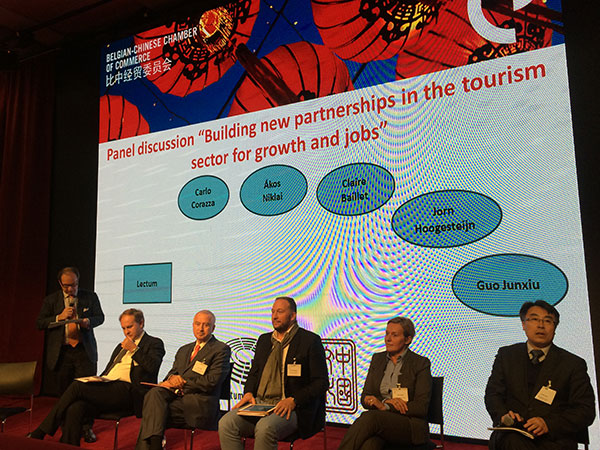Spring Festival diplomacy counters critics' claims
Updated: 2016-02-16 08:32
By Fu Jing(China Daily)
|
||||||||
 |
|
European and Chinese speakers told how tourism boosts the bilateral relationship. [Photo By Gao Shuang] |
Is the world facing a "lost" decade as it continues to struggle to emerge from the global financial crisis that originated in the United States in 2008? Amid continuous turmoil in the global stock markets last week, the plummeting price of oil to a new low and increasing geo-political concerns, fears, worries and dismay over the state of the Chinese economy have dominated the Western media in spite of the good feelings triggered by China's Spring Festival celebrations.
Once again, the country is being made a scapegoat for the falling stock markets, despite the obvious fact that the difference in monetary policy between the European Union and the United States has dented investors' confidence and the drop in commodity prices has mainly resulted from the decline in global demand, as the global economy is growing at a snail's pace.
Against such a backdrop, China's ambassadors in Europe started a "charm offensive" over the Lunar New Year by giving speeches, organizing get-togethers and talking with opinion leaders while offering Spring Festival greetings.
Among them was Liu Xiaoming, Beijing's envoy to the United Kingdom, who delivered more than 10 speeches in which he sought to inject confidence into his audiences, and Yang Yanyi, Beijing's ambassador to Brussels, who also spared no efforts with her "Spring Festival diplomacy", as she tried to persuade the European Union to join with China in an effort to "make the global cake" even bigger, instead of being short-sighted and taking advantage of protectionism.
Two impressive messages can be found in these Spring Festival messages.
First, China's economic growth rate of 6.9 percent is not a small deal, as it still contributes more than a quarter of global economic growth. And such growth has been registered at a time when its economic structure is being transformed. Last year, the service sector, for the first time in history, accounted for more than half of China's economic output, which should be seen as landmark progress in transforming the global factory where environmental woes still give headaches.
And of course, China is confident that it can maintain such resilience and continuously contribute to global growth.
Second, China's ambassadors in EU countries have high expectations for the respective bilateral relations. China's ambassador to Germany, Shi Mingde, for instance, has signaled that top-level exchange visits will increase, which has sent the message that both sides have achieved a consensus on boosting their relationship to an even higher level.
In addition, Brussels, while trying to handle the EU's migrant crisis and whether the UK will opt out of the EU or not, as well as terrorism and economic headaches, began a 10-week public consultation on Wednesday on whether to grant China market economy status, joining the 80 economies that have already done so. It is worth noting that none of the 80 economies have complained that jobs have been lost by granting China such status.
And also it is worth noting that at the height of the last financial and sovereign debt crises, the media, markets, politicians and investors in the West formed a vicious chain spreading fear and distrust in their search for a scapegoat, which delayed finding solutions to the crises.
Now, there is a sign that such a cycle is happening again. Beijing envoys' efforts in injecting confidence and expectations for a global recovery have been in sharp contrast with the fear and blame thrown at China by the Western media.
It's evident that confidence and trust are still in short supply. Not only China but other economies, media and opinion-makers need to act to rectify this state of affairs.
If they do, we could see a fulfilling decade ahead.
The author is deputy editor of China Daily European Edition. fujing@chinadaily.com.cn
- Global health entering new era: WHO chief
- Brazil's planning minister steps aside after recordings revelation
- Vietnam, US adopt joint statement on advancing comprehensive partnership
- European border closures 'inhumane': UN refugee agency
- Japan's foreign minister calls A-bombings extremely regrettable
- Fukushima impact unprecedented for oceans: US expert

 Stars of Lijiang River: Elderly brothers with white beards
Stars of Lijiang River: Elderly brothers with white beards
 Wealthy Chinese children paying money to learn British manners
Wealthy Chinese children paying money to learn British manners
 Military-style wedding: Fighter jets, grooms in dashing uniforms
Military-style wedding: Fighter jets, grooms in dashing uniforms
 Striking photos around the world: May 16 - May 22
Striking photos around the world: May 16 - May 22
 Robots help elderly in nursing home in east China
Robots help elderly in nursing home in east China
 Hanging in the air: Chongqing holds rescue drill
Hanging in the air: Chongqing holds rescue drill
 2.1-ton tofu finishes in two hours in central China
2.1-ton tofu finishes in two hours in central China
 Six things you may not know about Grain Buds
Six things you may not know about Grain Buds
Most Viewed
Editor's Picks

|

|

|

|

|

|
Today's Top News
Liang avoids jail in shooting death
China's finance minister addresses ratings downgrade
Duke alumni visit Chinese Embassy
Marriott unlikely to top Anbang offer for Starwood: Observers
Chinese biopharma debuts on Nasdaq
What ends Jeb Bush's White House hopes
Investigation for Nicolas's campaign
Will US-ASEAN meeting be good for region?
US Weekly

|

|









